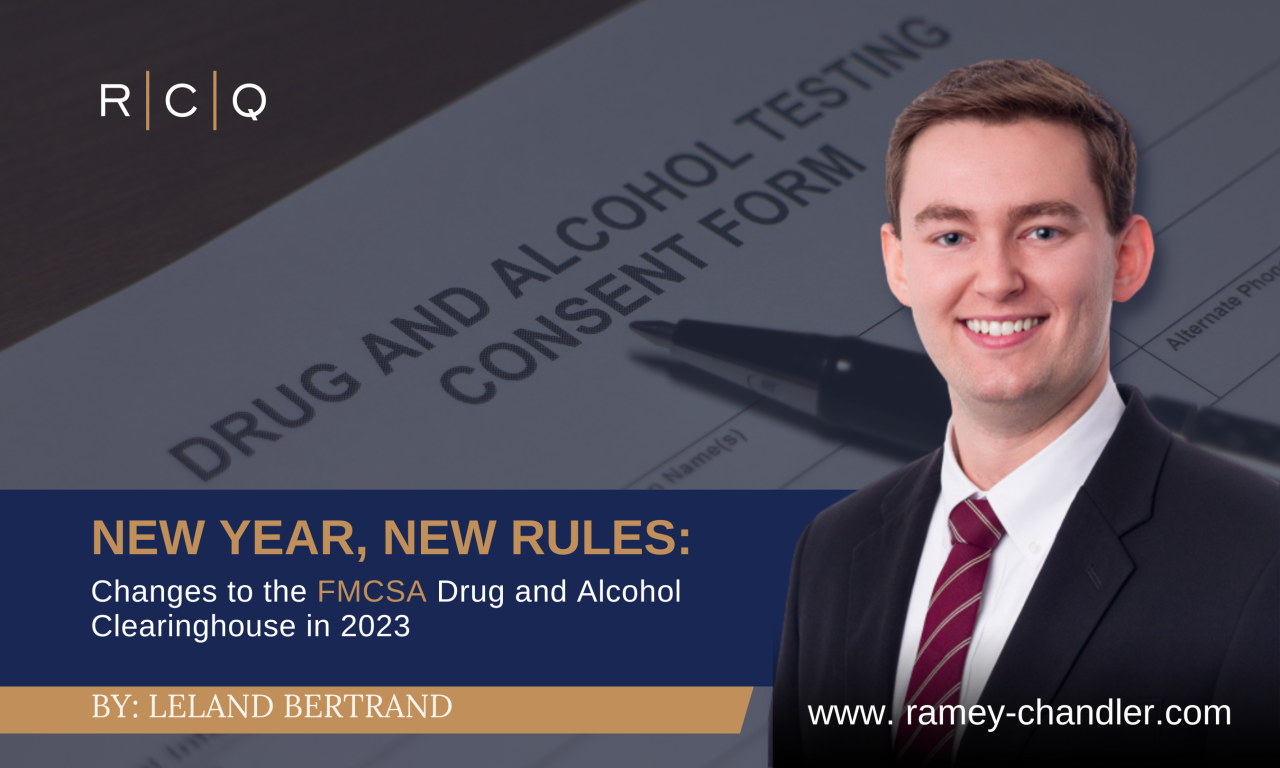New Year, New Rules: Changes to the FMCSA Drug and Alcohol Clearinghouse in 2023
As the new year is officially underway and resolutions are in full swing, it is important to note the recent changes to the Federal Motor Carrier Safety Administration’s (FMCSA) rules and regulations concerning commercial truck drivers in 2023. One especially significant change relates to the agency’s Drug and Alcohol Clearinghouse and how trucking companies can remain in full compliance with its policies.
First implemented by the Department of Transportation in January of 2020, the FMCSA’s Drug and Alcohol Clearinghouse is a centralized database that contains information about holders of commercial driver’s licenses (CDLs) and commercial learner’s permits (CLPs). There are more than 3 million CDL drivers and over 420,000 motor carriers registered in the Clearinghouse system. Despite these large figures, it is relatively private and limitedly available to employers, state driver’s license agencies, law enforcement, and drivers themselves.
The Clearinghouse indicates records of commercial drivers’ violations of the FMCSA’s drug and alcohol testing program, which could include positive drug or alcohol test results as well as refusals to test altogether. This database also alerts potential employers of a driver’s return-to-duty status and whether they have completed the required follow-up testing plan. Overall, the Clearinghouse has been instrumental in keeping roadways safer for all drivers by currently holding over 113,000 drivers in a prohibited status until it is deemed safe for them to return to duty. So far, over 42,000 drivers have completed the return-to-duty process and are back on the road.
When it initially went into effect, the system was largely lacking in data. Therefore, in addition to checking the Clearinghouse data themselves, carriers were also obligated to manually contact a prospective driver’s previous employer and ask about any possible drug and/or alcohol related offenses.
So, what’s new, you ask? As of January 6, 2023 (its third anniversary since officially launching), employers are no longer required to reach out to an applicant’s previous employers to investigate any drug or alcohol violations. Carriers are now permitted to rely solely on the Clearinghouse for this information.
While the burden on carriers has been slightly alleviated, they must still contact previous employers for non-drug and alcohol related inquires, pursuant to 49 CFR 391.23. Essentially, this federal regulation imposes a duty on motor carriers to request information about general driver identification and employment verification for the three-year span prior to a potential driver’s date of application. Commercial fleets must also ask whether a driver was involved in any DOT-recordable accidents while employed at that company. A DOT-recordable accident could occur when a vehicle had to be towed from the scene, a fatality occurred, or a person was injured and required immediate medical treatment away from the scene of the accident. Fault is not considered when determining whether a collision constitutes a DOT-recordable event, and records of these events must be kept on hand for three years.
If you are considering hiring a driver who was not previously employed by a motor carrier or that was employed by a company not subject to FMCSA regulations, you should still conduct a manual inquiry regarding drug and alcohol violations as well.
We recommend employers continue to fulfill their FMCSA obligations by:
- Conducting full inquiries of the Clearinghouse when onboarding a new CDL driver,
- Conducting limited queries of all CDL drivers at least once a year,
- Reporting any and all known violations to the Clearinghouse, and
- Documenting a driver’s progress in their return-to-duty process, while following up on required testing and any unresolved violations.
In the future, the FMCSA intends to make their system even more efficient. If all goes according to plan, by November 2024, all state drivers license agencies will be required to check the Clearinghouse data before issuing, renewing, or upgrading a driver’s CDL. Employees of those agencies would then likely be authorized to suspend or downgrade a CDL driver if an inquiry demonstrates that they are currently in a prohibitive status.
At Ramey Chandler Schein, P.C., our highly skilled attorneys have decades of experience handling complicated trucking accident claims. We can assist you in ensuring that either you or your clients are in full compliance with the FMCSA’s rules and regulation and are prepared to zealously advocate for our clients on matters addressed above, as well as others, that arise during litigation.
By accepting you will be accessing a service provided by a third-party external to https://ramey-chandler.com/

